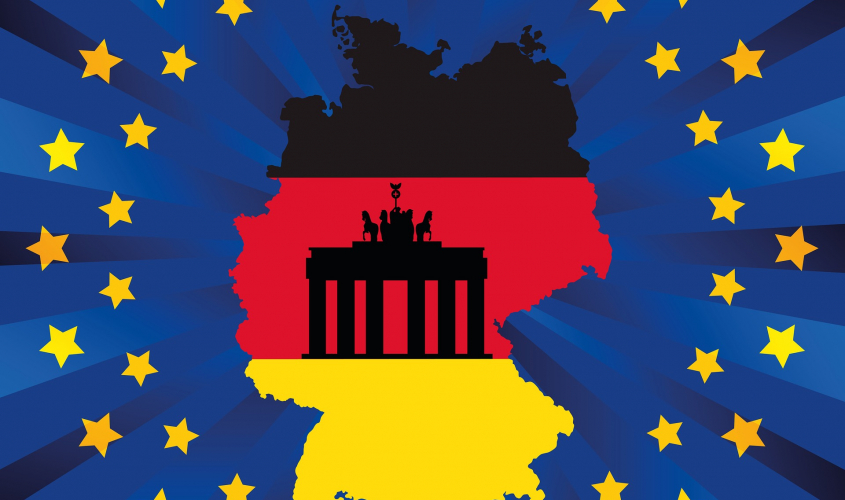We want a new beginning for Europe – AFCA Think Tank Working Paper by Hubertus Väth
Germany will serve in the current Presidency of the Council of the European Union until the end of 2020. During the German Presidency, many high-profile topics are on the agenda, including a video conference of European Union leaders with President Xi Jinping scheduled for mid of September, potentially followed by a personal meeting, the consent among EU member states on a 1.8 trillion Euro Multiannual Financial Framework including a 750 billion euro Covid-19 recovery fund as well as the ongoing negotiations between the European Union and the United Kingdom regarding Brexit.
The German Presidency of the Council of the European Union until year-end 2020
The Presidency, which rotates among EU member states for six-month terms, is one of the key institutions driving policy change within the EU and transferring member states’ political goals to a European stage.
Therefore, the Presidency is not only a formal role but offers the respective Presidency the opportunity to influence the further development of Europe. Considering Covid-19 pandemic, which has severely impacted European people and economies, it might be a fortunate coincidence that Germany currently holds the Presidency. Germany is the most robust economy in the EU and its Chancellor, Angela Merkel, has an outstanding reputation as one of the most experienced and longest-serving leaders of any major country.
The working program with the slogan “Together for Europe’s recovery” is based on the following guiding principles: Overcoming the Covid-19 pandemic permanently, as well as the economic recovery, a stronger and more innovative Europe, a fair Europe, a sustainable Europe, a Europe of security and common values, and a strong Europe in the world.
“We want a new beginning for Europe”
A videoconference between the President of the People’s Republic of China, Mr Xi Jinping, and the Chancellor of the Federal Republic of Germany, Mrs Angela Merkel, is expected to take place on 14 September according to the German press, potentially followed by an in-person meeting in the German city of Leipzig before the end of 2020.
At this meeting, intended to maintain and strengthen the relationships between the European Union and the People’s Republic of China, Angela Merkel will be accompanied by other EU leaders as she will act not as the German chancellor, but in her capacity as the President of the Council of the European Union (EU).
For six months, from July to December 2020, Germany holds the Presidency of the Council of the European Union. Considering Covid-19 pandemic, which has severely impacted European people and economies, it might be a fortunate coincidence that Germany currently holds the Presidency. Germany is the most robust economy in the EU and its Chancellor, Angela Merkel, has an outstanding reputation as one of the most experienced and longest-serving leaders of any major country.
In practice, both could transform the institutional powers of that Presidency into positive developments for the future of the European Union. The German working program emphasises that objective with the tagline “Together for Europe’s recovery”.
Within the EU: different institutions with different responsibilities and different origins
Even for most European citizens, the importance of the Presidency of the Council of the European Union appears enveloped in a subtle haze. This importance becomes understandable if light is shed on the institutional framework of the European Union and its origin as a union of member states.
The Council of the European Union is one of three legislative bodies within the EU, the others being the European Parliament and the European Commission. The Council is an intergovernmental body representing the executive governments of the member states. Each EU member state delegates one representative to express and represent the position of the member state’s executive branch. The Council meets in ten different configurations of 27 national ministers (one per state). Therefore, it is often informally dubbed the Council of Ministers. In addition, there are about 200 committees and working groups, always based on the principle of one delegate per member state.
The Council of the European Union and the European Parliament serve to amend, approve or disapprove the proposals of the European Commission, which has the sole power to propose laws. Jointly with the European Parliament, the Council holds the budgetary authority of the EU. However, the Council has greater control than the Parliament over the more intergovernmental areas of the EU, such as the common foreign and security policy or macroeconomic coordination.
The role and tasks of the Presidency of the Council of the European Union
The Presidency of the Council of the European Union rotates among the member states and is formally assigned to a member state for a six-month term. The half-year terms are very short and require a high level of coordination, but are an important sign for the equal and timely representation of all member states. For this reason, groups of three successive presidencies cooperate on a common political program. Currently, Germany holds the Presidency until year-end and cooperates with Portugal and Slovenia which will succeed with their Presidencies in 2021. France will hold the subsequent Presidency in the first half of 2022.
The Presidency chairs meetings of the various Council configurations, including committees and working groups. It is the Presidency’s job to prepare the Council’s work as efficiently as possible and to find compromises among the varying positions of the EU member states. The Presidency represents the Council in relations with the other EU institutions, especially the European Commission and the European Parliament. Its task, in negotiations and at meetings of a so-called Conciliation Committee, is to work towards agreements on legislative proposals.
At the beginning of its term, the Council Presidency submits a work program to the European Parliament, and at the end a report. Furthermore, the Council Presidency helps the other institutions to represent the European Union at an international level. The Presidency also speaks on behalf of the European Union at major international conferences.
Besides the Commission, the Parliament and the Council of Ministers, there is a fourth institution with a somehow confusing, because of its similar name: the so-called European Council. It consists of the heads of state or government of the EU member states, has its own full-time President and defines the European Union’s overall political direction and priorities. In that respect, it could be considered superior to the other institutions. However, it only plays a hybrid role as it has no legal power regarding its decisions, which leads to the fact that the respective Presidency of the Council of the European Union, being responsible above all, reaches the legal basis and initiates the implementation with Parliament, Commission and the Ministers following an agreement within the European Council. Overall, the Presidency might legally be restricted to the Council of Ministers, but it has far-reaching effects.
The first step addressing the Covid-19 pandemic with the EU Recovery Fund
In July, the German Presidency started with a historic deal representing a turning point for the EU. The Financial Times expected that the agreement “will rekindle a spirit of solidarity, which is the EU’s lifeblood.” At a marathon summit of four days and nights, the European Council agreed on a Multiannual Financial Framework (MFF) worth 1.8 trillion euro for the period 2021 to 2027. The leaders agreed on the plan arranged by German Chancellor Angela Merkel and French President Emmanuel Macron, which dedicates 750 billion euros for the sole purpose of addressing the economic consequences of the Covid-19 pandemic.
The EU Recovery Fund, named Next Generation EU, will be distributed to member states through 390 billion euros of grants and 360 billion euros of loans. For the first time, the European Commission is set to raise the 750 billion euros via bond issues which will create a new class of safe, euro-denominated assets. Markets already discuss whether these bonds will immediately compete with the Bunds, the German government bonds which are considered a safe haven, albeit scarce and therefore expensive. On a longer view, the EU bonds could become a rival to US treasuries, helping to strengthen the international role of the euro and overcome the fragmentation of European capital markets.
The guiding principles of Germany’s Council Presidency
For Germany, five issues are particularly important at this time. At the start of the Presidency, in her speech to the European Parliament, Chancellor Angela Merkel emphasised “our fundamental rights, cohesion, climate change, digitalisation and Europe’s responsibility in the world.” Further stating that “These five issues are important because we must lastingly transform Europe if we want to protect it and preserve it. For only then will Europe be able to play a sovereign and responsible role of its own in a rapidly changing global order.”
The guiding principles of the Presidency are as follows:
- overcoming the Covid-19 pandemic permanently, as well as the economic recovery
- a stronger and more innovative Europe
- a fair Europe
- a sustainable Europe
- a Europe of security and common values
- a strong Europe in the world
The agenda will focus on the significant challenges of our time, such as climate change, the digital transformation and the evolving world of work. The European Union shall stand for the environmental, social and economically sustainable prosperity to which it gives rise. In this way, the European Union intends to address the challenges posed by this crisis and pursue its longer-term strategic goals in a fast-changing world with renewed vigour.
The German working program states that in a world with an increasing rivalry between major powers, European policy must strengthen Europe’s ability to act in the wider world to defend European interests and values and to assume its responsibility in the world. Germany is committed to an international order based on rules and human rights in which the European Union plays a role in shaping standards and norms worldwide.
One key topic of the Presidency has been the ongoing negotiations with the UK on Brexit. Although there is not an agreement in sight, the European Union still hopes for a positive result. Germany will work to ensure the continued cohesion of the EU27. The objective is still an attractive agreement for both sides based on the jointly agreed Political Declaration.
A sustainable financial market architecture
The German Presidency will also focus on financial markets. Germany wants to deepen the Capital Market Union in order to promote capital market-based financing and further integrate the European capital market, making it more competitive internationally. The aim here is to improve the financing of the real economy as well as strategic investments. Germany also supports the continued development of the banking union in order to increase the stability of the financial system and to strengthen the European single market.
The advancing digitalisation of the financial services sector offers opportunities for new business models, products and providers, as mentioned in the program. However, Germany considers this as bound up with risks and leading to profound changes in the market, making regulatory adjustments necessary. With the creation of a digital financial market union, Germany wants to dismantle existing barriers to cross-border digital financial services in order to remain competitive internationally. It intends to support the work in the context of the digital finance strategy announced by the Commission as well as regulatory proposals in areas like crypto assets in order to help strengthen the sovereignty of Europe’s financial market.
“A new beginning for Europe”
In a speech to the European Parliament, Angela Merkel summarised the basic principles of the Presidency. The “top priority is to see Europe emerge from the crisis united and stronger. But we don’t merely want to stabilise Europe for the short term. That would be too little. What we want is a Europe that gives grounds for hope. We want a Europe that tackles the tasks at hand courageously and with self-assurance. We want a Europe that is capable of coping with the future, that holds its own in the world in an innovative and sustainable manner. We want a new beginning for Europe.“





